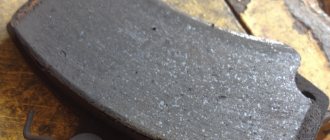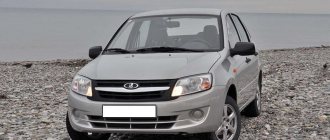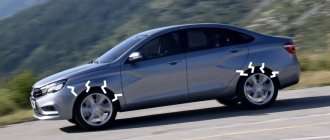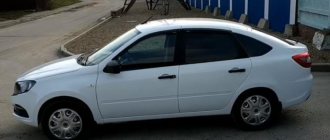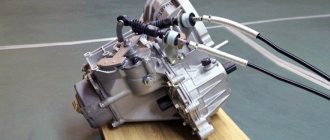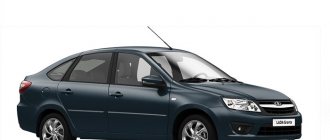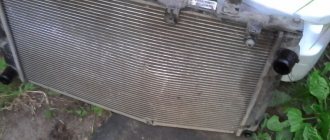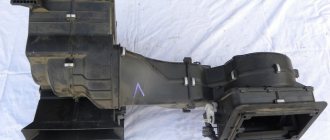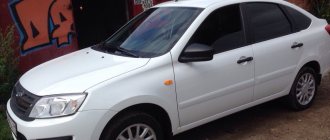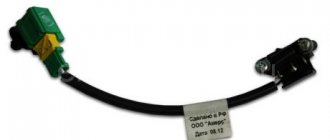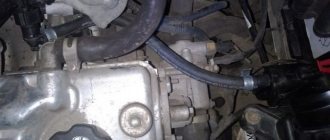Many car owners have noticed that when braking, a squeaking or whistling noise may appear. When figuring out why the brakes squeak and whistle, it turns out that it is the brake pads squeaking. When visiting a workshop, drivers will hear: “The low-quality pads need to be replaced.” But the parts were purchased at a large auto store, or supplied at a car dealership. How to explain this sound from the brake system?
Experienced drivers and car service technicians say that brakes whistle and squeak only partly due to the quality of the pads. We will find out all the reasons for such brake sounds and give advice on how to eliminate the problem.
Poor quality pads
If you hear a whistle when braking, and the pads have recently been replaced with new ones, then their quality is not up to standard. When rubbing with a disk, they crumble and become covered with dust. In this case, it can be argued that the material of the pads does not combine well with the material of the brake discs.
Pads are made from different friction materials. The layer involved in friction includes metal shavings: brass, copper and steel. These elements cause this nasty squeaking noise during braking.
It usually disappears if you replace the pads with quality products. It cannot be stated unequivocally that the sound in the form of a whistle is the cause of defective friction linings. They simply do not match the composition of discs or drums.
Why and when we encounter grinding
If we compare the degree of harm from squeaking and the consequences of a tight clutch, then the second is more dangerous to health. But squealing is hard to come to terms with morally. Every now and then it gives me a headache.
In 80% of cases, the symptom occurs after changing the pads. It happens that even the “originals” whistle. Those who have not looked beyond the rim for a long time or have entrusted this matter to inexperienced service workers are also faced with this fact. In humid weather, grinding noise is also possible.
Brake system defects
Another possible cause of squealing brakes can be vibration of the pads. These are microvibrations that arise from malfunctions of other elements.
Main malfunctions - causes of squealing brakes:
- a bead has formed along the outer diameter of the disk;
- the caliper jams when braking - the guide is not lubricated, the caliper piston moves poorly;
- Friction linings fall off, cover the caliper with dust, which jams;
- The caliper guide bushings have become rusty due to corrosion.
Note: constructive measures aimed at preventing whistling
A microscope is not needed to examine engineering tricks. They are of a purely technical nature. We have already talked about one of them - anti-squeak linings on the back of the products. Find out about other means of combating vibration below:
- Bevels and slots on the friction layer move resonant vibrations to higher frequencies.
- The slots perform a role similar to bevels + remove dirt from the contact patch.
- Anti-vibration plates dampen vibrations relative to the piston and caliper bracket.
- Specially curved elements on the back of the pad fit tightly into the working cylinder, which helps to avoid noise in many braking modes.
- Wire brackets dampen vibrations of the friction part along the guide.
- Damping bushings are installed on one of the caliper guide fingers to absorb vibrations.
Every car owner is familiar with the unpleasant feeling associated with the whistling and grinding of car brakes. Hearing this heartbreaking sound, many panic. But is it really that bad? What is the general nature of brake pad grinding? Let's take a closer look at these issues.
Other causes of squeaking
Sometimes small gravel gets between the disc and the casing while driving. It can also contribute to the squealing noise produced by the brake components.
Drum brakes also sometimes whistle and squeak. Many Russian cars and foreign cars have rear drum brakes. When a whistling sound appears in this type of brake design, the reasons are the same as in the disc design. But there are also differences due to the characteristics of the device.
If the disk system linings are too dusty, the dust is removed outward and does not remain on the surface of the linings. And in the case of a drum structure, dust settles inside on the parts and drum. Clean the elements from dust and the brake whine will stop.
If your car's brakes squeak and whistle, remember our tips and eliminate the causes. To do this, just remove the wheels, drums and look at the brake elements.
Have you ever encountered a situation where, when braking, extraneous noise appears from behind the car (knocks, impacts, squeaks)? This problem can occur on any Lada car (for example, Kalina, Priora, Granta, Largus, Niva, Vesta or XRAY). Let's talk about possible solutions to this problem.
Unusual cases of grinding noise on the front and rear wheels
The route map is designed for standard circumstances, when squeaking appeared on old pads during soft braking or immediately after replacement. What to do if everything was fine in the summer, but with the advent of cold weather a squeal appeared? Or what to do if a squeaking noise appears even when the brake pedal is released? Look for answers in a special selection:
- The brakes began to squeak in the cold. During a thaw, moisture may settle on the discs. If the process is regular, lubricate the back side of the pads.
- Whistle even when the brake is not pressed. Overhaul the brake calipers. Make sure that they move freely along the guides and that the working cylinders do not jam.
see also
Comments 28
I have exactly the same issue. It's been squeaking for six months now. They live their own lives, and may creak immediately or a little later, in different weather. Mileage almost 40,000
We need to look at the mileage)) But that’s not the point)
But I actually have new pads, the new drums won’t fit
Well, read the Internet, there is everything about squeaking. Briefly: if they squeak, they will last a long time and work reliably; if they don’t squeak, then the pads are soft and need to be changed often. Choose. I like the signature Zhiguli creaking sound. Moreover, no one got rid of the squeak for a long time.
I like the signature sound of Mazda's V6, but that's not what it's about))
Well, read the Internet, there is everything about squeaking. Briefly: if they squeak, they will last a long time and work reliably; if they don’t squeak, then the pads are soft and need to be changed often. Choose. I like the signature Zhiguli creaking sound. Moreover, no one got rid of the squeak for a long time.
I don't have a squeak. There is only a rustling sound when it’s cold, when driving in the morning at the very beginning, in courtyards for example, but then it seems to be gone. I had different pads: factory ones, of course (the most normal), then Nippon (so-so), now trially (better than Nippon, worse than factory ones). Although I remember several times there was a creak on already badly worn Nippon pads and equally worn Alnas or Ats drums (I don’t remember exactly), I decided to replace them with Trialli pads and drums, so far it’s ok.
Rear drum brakes whine
Many car owners have noticed that when braking, a squeaking or whistling noise may appear.
When figuring out why the brakes squeak and whistle, it turns out that it is the brake pads squeaking. When visiting a workshop, drivers will hear: “The low-quality pads need to be replaced.” But the parts were purchased at a large auto store, or supplied at a car dealership. How to explain this sound from the brake system? Experienced drivers and car service technicians say that brakes whistle and squeak only partly due to the quality of the pads. We will find out all the reasons for such brake sounds and give advice on how to eliminate the problem.
Let's sum it up
High-quality brake operation in a car is one of the most important features of a safe trip. If operating the machine causes certain difficulties or discomfort in terms of braking, you should immediately contact a service station and solve the problem. Otherwise, you may encounter unpleasant situations when braking turns out to be ineffective at a difficult moment and cannot provide the necessary operating features. Considering the importance of the braking system for safety, it is better not to joke with this unit and do all the work on time. Creaking and grinding noises can occur if you do not comply with the manufacturer's important car maintenance requirements.
Simply replacing your brake pads when squeaking begins can save you money, time, and keep you safe. To completely avoid trouble, it is enough to carry out the inspection on time and respond to all unpleasant manifestations. The behavior of the car, as well as the sound effects of problems, can also be an important point in diagnosing the car. Often these moments are an important harbinger of problems. What do you do if your car starts making any unnatural noises?
Why even new pads squeak when braking smoothly?
The whole difficulty is that the reason can only be found by brute force. If a defect appears immediately after replacing the friction linings, you have to think only about the fact that they have not gotten used, about problems with their quality, or about the absence of anti-squeak plates on the back of the part. If no one serviced the brake system the day before, inspect all components:
- Pads. Some models are equipped with “squeaks” - special metal brackets attached to the side of the product. When the friction part wears critically, the metal comes into contact with the disc, and we get a squeaking sound.
- Brake discs. They wear out and often unevenly. Allowable end runout is no more than 0.020 mm.
- Caliper. Wedging of the working cylinders and the entire structure on the guides is not allowed. Torn anthers must be replaced, fingers must be lubricated with a special compound that is resistant to high temperatures.
There is no need to carry out an inspection if the disk has been exposed to water, sand or has become corroded.
You can do nothing, as in the case of the alternator belt whistling in the cold after driving through a puddle, or perform a series of long, smooth braking. This will help dry the part or remove dirt from it. For example, repeat the cycle three times: acceleration to 80 km/h and smooth deceleration to 20 km/h. If the pads squeak when braking after a recent wash, get ready to find a turner or go to the store. Cold water falling on a hot disk leads to improper hardening. As a result, it wears unevenly and runs out.
For your information. Ceramic parts tend to squeak when cold. They have a slightly higher setting temperature than conventional brakes, so the whistle goes away after a few brake applications.
How the brakes work
When the driver presses the pedal, the pressure in the brake system increases, causing the pads to clamp on the brake disc and it stops rotating. From the moment of clamping until the disc stops, several seconds pass, during which the pads vibrate.
At this moment the whistling sound occurs. It is not always audible to the driver, but only if there is something wrong with the brake system. By the way, the grinding noise is amplified by the wheel arch, which in this case plays the role of a kind of sound amplifier.
Simply incompatible
The pads are not always to blame for the appearance of extraneous sounds, because they work “in close contact” with the discs. The sound quality depends on the compatibility of the friction lining and disc materials. The same pads can completely suit one car owner and greatly irritate another with their squeaks. Ideally, the components of the friction pairs should be manufactured by the same manufacturer: this minimizes the risk of “incompatibility”. But there is still no guarantee that the brakes will work quietly.
Wear - critical
Those who are used to calling in for service only when the car breaks down have probably encountered this situation: the pad lining is completely worn out, braking occurs with a metal plate (base) on the disc. More often than not, this is caused by ignoring timely diagnostics and maintenance. But don’t rush to just install new pads - perhaps one of the pistons is jammed, as a result of which
and increased wear occurs. It is easy to determine the malfunction: other pads in such cases are in a much more efficient condition.
Of course, sounds when braking have nothing to do with its effectiveness. However, we can say that squeaking does indirectly affect safety: it provokes the driver to use the brakes less often and makes him nervous every time he presses the pedal. So, if getting rid of loud brakes does not require a lot of money and time, it is better to deal with them as quickly as possible.
Knocking under the hood, whistling.
If you hear a knocking noise under the hood of your car, please be very careful, as the cause of such a knocking noise may be a specific engine malfunction. These sounds can primarily be associated with three main causes of fuel ignition (combustion) malfunction in the engine combustion chamber. The first reason may be related to ignition problems (malfunction of the ignition coil, high-voltage wires). Another (second) cause of this malfunction may be a clogged injector.
Please remember that due to poor ignition, pops or knocks can occur under the hood of the car, which can lead to excessive detonation when burning fuel in the engine itself. And detonation, friends, can damage the engine.
Due to incorrect or faulty ignition, several flame sources can form in the combustion chamber, which, when meeting each other inside the engine, will create excess pressure in the combustion chamber. Detonation is a big problem for an engine. It can significantly damage the engine pistons.
If your car has an ignition problem and this is due to low-quality fuel and possibly for other reasons, then fill the fuel tank with high-octane gasoline and this way you can correct the problem that has arisen in the car.
How the inner CV joint crunches
Inner CV joint design
Internal hinges are diagnosed differently. To determine which CV joint is faulty, left or right, you need to find a straight road with significant potholes and drive along it. If the hinge is broken, it will “knock.”
Let us describe another interesting method for determining how the inner CV joint crunches, which consists in not hanging the wheels, but significantly making the rear part of the car heavier (put a lot of people in, load the trunk), that is, make the front of the car rise and the axle of the inner CV joint curved as much as possible. If in this position you hear a crunching sound while moving, then this is one of the signs of a malfunction of the mentioned unit.
Consequences of ignoring a knock
Any extraneous sounds that appear while driving must be identified without delay, as their presence may indicate a serious malfunction. In this case, let’s look at the consequences of knocking in the rear suspension:
- If problems arise in the guides and are not resolved in a timely manner, in addition to material costs, controllability may deteriorate; in some cases, this malfunction leads to a situation where the suspension is secured only by a spring and a shock absorber. The result is wear and tear of all elements, creating an emergency situation.
- If the spring is damaged, the car sways on uneven roads. In addition, the spring does not limit the movement of the shock absorber. The result of spring wear is terrible stability of the car on the road and damage to other suspension elements.
- Failure of shock absorbers is accompanied by a constant knocking sound. As a result, severe wear occurs on the fastening elements, as well as the shock absorbers themselves. In this case, controllability deteriorates significantly, and strong roll is possible when turning at high speed.
In most cases, a knock in the rear suspension is detected almost immediately, as it occurs while overcoming a bump or pothole on the road. As a rule, suspension elements fail after their service life has expired. If you replace parts in a timely manner, you can avoid road accidents and serious material costs.
Expert opinion
The reason for the occurrence of squeaking when braking lies in the resonance phenomena that occur in the friction pair - the brake pad and disc. Manufacturers try to minimize noise during braking by installing anti-squeak plates on the back side of the pad, applying anti-noise mastic and adding special components to the friction mixture. But first of all, the manufacturer provides technical indicators - a stable friction coefficient of the brake pad as a guarantee of our safety.
I would like to note that whistles and squeaks do not in any way affect the quality of braking. They usually occur at the moment the pad touches the disc and in the final phase, when the brake pedal begins to be released. These are resonant phenomena that can appear and disappear depending on the temperature and humidity of the environment. But if squeaking accompanies the entire braking process and constantly gets on your nerves, I advise you to first stop by a service center and ask a mechanic to assess the condition of the pads and discs (drums). Sometimes it is enough to simply clean the surface of the friction lining (it may contain abrasive particles from road dust) or you may need to sharpen the discs to get rid of unpleasant sounds.
In cases where all other measures have been exhausted, I recommend replacing the brake pads. And don’t buy frankly cheap ones - they not only make a lot of noise, but also work ineffectively.
Did you like our site? Join or subscribe (you will receive notifications about new topics by email) to our channel in MirTesen!
Source
Worn or broken caliper parts
Brakes are a reliable and well-functioning mechanism. However, there are many reasons why the pads stop expanding, are pressed skewed, and so on.
How to fix the problem. The caliper pins and pad guides must be lubricated and free of rust or dirt. It is especially important to revise them after winter. Otherwise, you will hear a prolonged squeak, which will signal that your pads are not in place after braking.
Also, don't forget about the caliper pistons. They also need to be checked after a salty winter. The boots should not be torn, there should be no damage or mineral deposits on the surface of the pistons, and the pistons should not warp during operation.
The springs of the drum brakes that bring the pads together also require maintenance:
